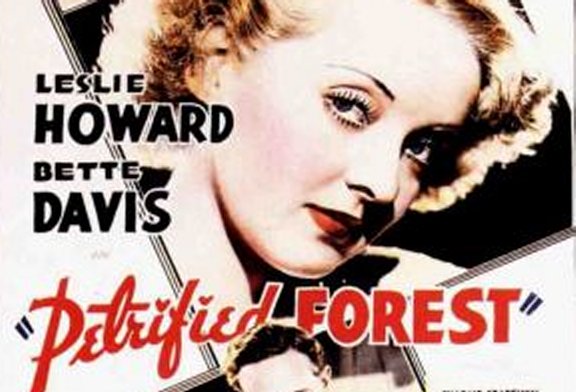
Movie Review: The Petrified Forest (1936)
The Petrified Forest is a famous play by Robert Sherwood. The fact that I have to explain that should indicate just how famous a famous play really is. Most people don’t go to live theater very often. But The Petrified Forest is also a famous movie, where two future greats (Bette Davis and Humphrey Bogart) made early appearances.
But it’s really a movie about fascism. Robert Sherwood was a political playwright, and he wrote plays that tended to be heavy on ideas and not so heavy on characters. In fact, the characters in The Petrified Forest are not people, they’re archetypes. They represent the ways that different types of people respond the rise of a dictator.
There’s a jock who is all athletic ability and no planning skills. There’s the old man who sees the world through the lens of nostalgia. There’s a very young woman who is naive enough to be optimistic. There is the hard-working business owner, who is also a community leader who has faith in “the system” even as it lets him down. There is a wealthy man who is too busy to notice politics, and his wife, a society woman who resents her status as a “trophy” and considers “tough guys” sexy.
All of them fail when confronted by the brutal reality of a gang with guns. The society woman makes a pass at the gang leader. The business owner is off hunting imaginary villains when a real one shows up at his gas station. The rich man is completely unable to see how any of this has anything to to with his business. The old man practically flirts with the “desperado,” laughing it up as the world crumbles. The jock is the only one who mounts a credible attack on the monster, but he fails due to lack of help from his fellow hostages and his own lack of training with weapons.
But the true failure, rising above all in this tragic comedy, is the intellectual, played by the foppish Leslie Howard, who looks stylish even as a homeless street-person. This “writer” can’t bring himself to confront the idea of the monster. Instead, he concocts a plan to get himself killed, so that money from his life insurance policy will pay for a lovely trip for his new friend (the young woman), allowing her to visit her mother in France, and somehow become “one of the great women of France.”
We’re misled, here, by the fact that Hollywood movies tend to follow certain tropes and we don’t expect this one to be different. We’re used to a “heroic couple” who’s love “triumphs over all.” That particular notion misleads us here. The intellectual is not preparing to snatch victory from the jaws of defeat. He’s volunteering to go to his death, for a stupid reason. He’s not fighting the monster, he’s throwing himself at the monster’s feet in the name of martyrdom, and in so doing he’s demonstrating moral cowardice so vast it makes his physical courage seem irrelevant. Perhaps the worst part of this betrayal of all that is good and holy is that he drags a young person down with him, slapping her with a “martyr trip” and demanding that she be “worthy of his sacrifice.” He practically climbs in the cattle car to the death camp with a smile on his face.
What a creep. But Sherwood was living in an age where fascist dictatorships were popping up all over the globe. Italy, Germany, Spain, Hungary, Rumania and Bulgaria. China. Let’s not forget China, where Chiang ruled as a fascist dictator, the only one on the “right” side in war.
I was forced to read The Petrified Forest in high school, along with Rhinoceros, by the Rumanian playwright Eugene Ionesco. It was a little High School in the middle of a little Oregon town, but somebody there, a young woman who taught classes at the high school whose name I do not recall, knew that something was up.